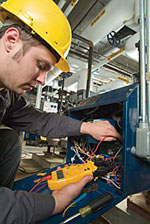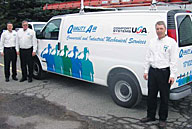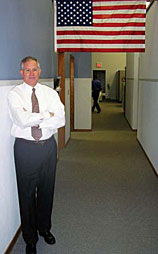Of the original four publicly traded HVAC consolidators, only one remains today in its original form, Comfort Systems USA. Not only has the company retained its corporate image, but also it has recently declared the first dividend on common stock in its history, dating back to 1997. That's a feather in the cap of the Houston-based company's presidents and corporate officers.

A HISTORICAL PERSPECTIVE
1997 is a far cry from the current Comfort Systems USA business model. In its prime, the company brought 119 different companies under the same banner during a two-year stretch with revenues reaching $1.6 billion."We created a tremendous amount of debt to fund those acquisitions," said Bill Murdy, chairman and CEO of Comfort Systems USA. "By mid-2000 we were heavily leveraged with $346 million in debt and the company had run into cash flow and profitability problems that we needed to remedy."
Murdy said the company needed to pull in the reins on its spending, conserve working capital, close out projects in a reasonable time frame and get itself into an overbilled situation. Through these measures, the company reduced its debt about $150 million by September 2001.
Having reached the point where further debt reduction through working capital conservation was difficult, the company planned to raise $200 million in long-term high-yield bonds. Murdy and the then CFO Gordie Beittenmiller went to New York City to put the package together with investment bankers on Sept. 10-11, 2001. They were meeting with JP Morgan Chase in midtown Manhattan the morning of Sept. 11 when the terrorist attacks brought down the World Trade Center buildings. The attack also brought down the high-yield bond deal as the markets went into disarray.
"At the time there were clear indications of the cyclical downturn in the commercial/industrial sector," added Murdy. "We needed to do something to reduce our still large debt load so we turned to plan B which was to sell assets."
Comfort Systems USA was comprised of union and non-union members at the time. Murdy learned that the EMCOR Group Inc. (www.emcorgroup.com), a company made up of union contractors, was interested in purchasing Comfort's 19 union companies, which represented $600 million in revenues. A deal was struck and EMCOR bought the companies for cash in 2002. Comfort used the cash to reduce its debt to low double digits.
Murdy added, "The deal also gave us an identity as a non-union HVAC mechanical focused on the commercial/industrial sector, since some of the union shops we had before did a lot of work outside of the HVAC realm."

All of this prepared the company for the downturn in the market that started Sept. 2001 and lasted until the end of 2003. The company remained profitable and cash flow positive even during those times, and now enjoys a cash supply of over $30 million. Today, Murdy calls the company a "functioning operating company instead of a loose-knit consolidator."
Murdy said the company would have liked to have been more profitable but the economy, combined with some units not functioning as well as projected, kept the profit picture lower. The picture changed in 2004 as the commercial/industrial economy improved and some underperforming units performed positively.
Today the company is made up of 40 companies doing $900 million in revenues and employs just under 6,000 people. As of Sept. 30, 2005, Comfort reported record revenues and profit and has its largest backlog ever.

THE FUTURE
The future strategy has three parts. First is productivity; delivering well. "We are doing a lot in that area, e.g. including project management, superintendent, service sales, and service operations training," said Murdy. "Productivity is job one."Secondly, since more and more of what is being done is in the commercial/industrial HVAC sector is service, maintenance, and retrofit, we want to grow that side of the business, but not to the detriment of our existing installation business.
"The third is growth. We want to concentrate on internal and organic growth. Some of our individual companies might make step-out moves without acquisition, just by entering into a nearby market. We want to bring in other companies who want to be part of Comfort Systems USA. We want companies that are balanced between installation and service that have size and strength. We also want companies that are in geographic markets where we aren't currently located."
"We are back to the point of slow-measured acquisitions where prudent we will look at adding more companies," said George.
For now, Murdy is happy with the "state-of-the-company" and the people who make up the Comfort Systems USA family. "There is a growing pride among our people that they are proud to be part of a successful company," he said.
"The strength of Comfort Systems USA is the local operations. The presidents operate in largely an autonomous fashion. They know their markets the best. Many are the same people who were operating the companies five years ago. We also have very strong regional vice presidents who work with the companies."

MEMBER COMPANIES TALK
Joe Nichter is president of Tri-City Mechanical, Chandler, Ariz. His company is a former winner of theThe NEWS'Best Contractor to Work For contest. Nichter has spent 31 years in the HVAC industry, the last 21 with Tri-City. The contractor has been a part of Comfort Systems USA for nine years and sees a lot of good things for the future."Although there were several bumps in the road since our inception, which have resulted in a lower stock price, loss of some companies, employee turnover, and some bad publicity about consolidations, Comfort Systems USA remained optimistic," said Nichter. "We truly follow our national identity of Quality People Building Solutions, while at the same time maintaining our local identity of "A Team Maintaining Our Customers Trust."
"Tri-City believes that we have only begun to tap the full potential of national consolidation. The leadership continues to promote and encourage an entrepreneurial spirit and as a result we constantly have inquiries from companies interested in joining us. Our future is bright and opportunity exists within our organization. I expect our path for the next few years will be to attract the best of the best, resulting in strong continual growth."
Katharine Hess Teitel has been the president and CEO of Hess Mechanical in Upper Marlboro, Md. since 1999. Hess started with the company in 1982. In April 1998, Hess Mechanical became a subsidiary of Comfort Systems USA.
Hess is proud of the fact that Comfort Systems USA has been flexible enough to ride the ups and downs of the economic and business cycles over the past several years.
"Comfort Systems USA has been successful for many reasons," she said. "First, we have excellent, ethical corporate management providing clear goals and vision for the company.
"Second, our company does not take a one size fits all approach and decentralizes decision making, recognizing that presidents in individual companies need the ability to operate in their respective markets without micromanaging from corporate, keeping the entrepreneurial spirit alive.
"Third, the company takes advantage of economies of scale when it makes sense, i.e. insurance, bonds, national purchasing agreements, safety, and training.
"Fourth, the company provides support, encourages companies to share best practices, and provides opportunities for training and personnel development.
"Fifth, the company recognizes that employee benefits are very important in our ability to attract and retain talented employees even though the cost of providing benefits has increased dramatically over the years."
J.R. Griffin is president of Climate Control Inc., South Boston, Va. He has been with the company since 2001 and has over 27 years of experience in management and marketing.
He said his workforce of 160 employees "are proud to be a part of Comfort Systems USA and the national presence that it brings to the market along with its financial strength.
"I think that Comfort Systems USA is presently in a very good position with our current balance sheet and $0 of debt. That alone creates respect in the industry.
"As for our immediate market, I believe it is continuing to improve from what we have seen the past couple of years. We are presently enjoying a strong backlog of work that is in close proximity to our office and are looking forward to 2006."
For more information, visit www.comfortsystemsusa.org
Publication date: 01/09/2006

Report Abusive Comment